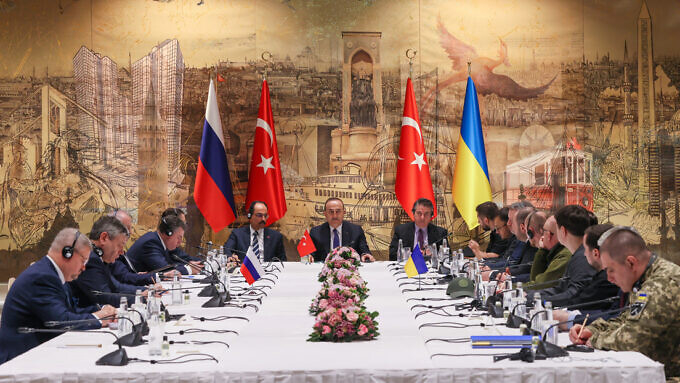
New round of peace talks took place between Russian and Ukrainian officials in Turkey, Tuesday, March 29. Photo: Cem Ozdel / Anadolu Agency via Getty Images.

Orinoco Tribune – News and opinion pieces about Venezuela and beyond
From Venezuela and made by Venezuelan Chavistas

New round of peace talks took place between Russian and Ukrainian officials in Turkey, Tuesday, March 29. Photo: Cem Ozdel / Anadolu Agency via Getty Images.
Russia has taken “two steps towards the de-escalation of the conflict in Ukraine,” one in the military field and the other in the political sphere, said Vladimir Medinsky, head of the Russian delegation in the peace negotiations.
At a press conference following the meeting held with Ukrainian representatives in Istanbul, Turkey, this Tuesday, March 29, the Russian delegation detailed the steps it will take to de-escalate the conflict:
• At the military level: The decision has been made to drastically reduce military activity in the vicinity of Kiev and Chernigov.
• At the political level: The possibility of a meeting of the Russian and Ukrainian presidents at the time the future peace treaty is signed.
The leader of the Russian delegation said that Ukraine renounces its intention to recover Crimea and Donbass by military means.
“After today’s substantive debate, we have agreed and are proposing a solution according to which the heads of state will meet at the same time a peace treaty is signed by the foreign ministers,” clarified the head of the Russian delegation in relation to this political step.
The Russian representative explained that since the outset of the conflict there was the possibility of a meeting between Ukrainian President Volodymyr Zelensky and Russian President Vladimir Putin, but only after the agreement was signed.
RELATED CONTENT: Russia: We Won’t Supply Europe with Gas Unless Purchased with Rubles
“The format envisaged [initially] was as follows,” clarified the head of the Russian delegation. “First, an agreement is prepared, then the negotiators approve it, it is signed by the foreign ministers at a meeting, and then the possibility of a meeting of the heads of state is discussed to sign this agreement. It is not an easy task, especially since the meeting could be multilateral and involve guarantors of peace and security in Ukraine.”
“Constructive meeting”
Medinsky also stated that Russia has received written proposals from Ukraine confirming its intention to assume a neutral and non-nuclear status.
“It was a constructive meeting,” Medinsky said. “We have received proposals from Ukraine that its clearly formulated position be considered and included in the treaty. These proposals will be studied in the near future and reported to the president.”
Speaking to journalists, Russian Deputy Defense Minister Alexánder Fomín called on the Ukrainian authorities “to strictly abide by the Geneva Conventions, including with regard to the humane treatment of prisoners of war” and the renunciation of torture.
Ukrainian proposals
The Ukrainian side also held a press conference after the talks in which it explained its proposals to the Russian delegation.
According to these, the members of the UN Security Council could be the countries that guarantee security for Ukraine. The list will be open and any nation could join.
RELATED CONTENT: How Does the Ukraine Conflict Affect Venezuela’s Economy?
The key requirement for a peace treaty is that there are clear security guarantees for Ukraine, which should be similar to NATO’s Article 5. The guarantor countries would be required to ratify the document. If Ukraine were to be the target of aggression, after a maximum consultation period of three days, these countries should help with weapons and even with the closure of Ukrainian airspace.
One of the points of the agreement could include negotiations on the status of Crimea and Sevastopol for a period of 15 years. During this period of time, military force may not be used for decision-making.
Ukraine would assume the obligation not to host foreign military bases on its territory and not to enter into international political-military alliances.
The issue of the status of the Donetsk and Lugansk people’s republics will be a subject of negotiation between the presidents of Russia and Ukraine.
Medinsky’s comments
Ukraine’s proposals on security guarantees do not apply to Crimea, Sevastopol, and Donbass and presuppose that Ukraine “renounces the intention” to recover these territories “by military means,” accepting that “it is only possible through negotiations,” Medinsky said.
“Of course this does not correspond in any way to our position, but Ukraine has formulated its approach,” Medinsky added. The Russian negotiator also announced during a television broadcast that Ukraine “renounces entry into military alliances, the deployment of foreign military bases and contingents, and military exercises” on its territory “without the consent of the guarantor states [of security], including Russia.”
“For its part, Russia is not against Ukraine’s intention to enter the European Union,” Medinsky said, calling Kiev’s proposals a constructive step towards compromise. He also noted that the proposals presuppose the proclamation of Ukraine as a state that will always maintain neutrality under international legal guarantees.
Featured image: New round of peace talks took place between Russian and Ukrainian officials in Turkey, Tuesday, March 29. Photo: Cem Ozdel/Anadolu Agency via Getty Images.
Translation: Orinoco Tribune
OT/JRE/SL